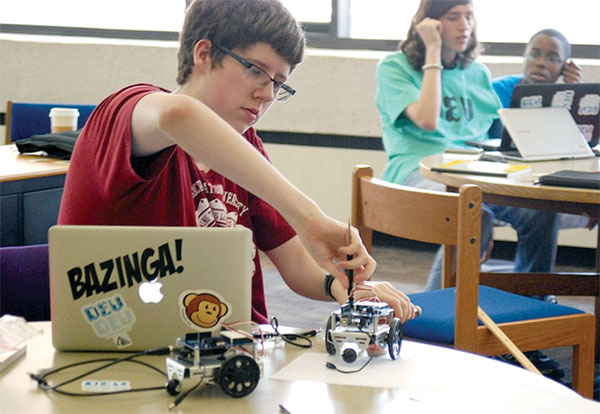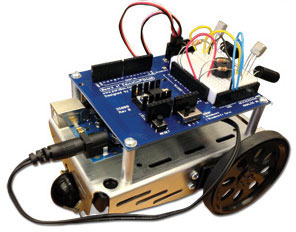
The “2nd Floor” is a space for kids, tweens, and teens at the Chattanooga Public LIbrary.
Computer coding programs and robotics are just some of the tools intrepid young patrons will be using this summer as school and public librarians nationwide gear up for technology camps.
“A lot of school librarians treat summer like a refresh and get-away-from-work time,” says Melissa Techman, a school librarian at Broadus Wood Elementary School in Earlysville, VA. “I never mastered that.”
Techman is always one to roll up her sleeves, write code, and remix video alongside her students. She’s currently developing a summer program with her local public library around Mozilla Webmaker, a hub for teaching digital skills.
Justin Hoenke, teen librarian and manager of the 2nd Floor kids and teen space at the Chattanooga (TN) Public Library, is also gearing up for summer. Last year, the library ran a four-week camp called “Dev Dev” (Developing Developers), in which students learned to code HTML, Python, and CSS and played with robotics. Hoenke believes that summer is the perfect time to work with students.
“During the school year, kids are so booked with extracurricular activities,” says Hoenke, who blogs at justinthe librarian.com. “The summer is a good time to hook them to get into the library.”
For many, camp brings to mind memories of fishing on a lake, scratching mosquito bites, and roasting marshmallows. But for others, camp is an opportunity to wade knee-deep in technology—at the library.
Hoenke didn’t go it alone. He enlisted the help of a local technology nonprofit, Engage 3D, as well as the American Institute of Graphic Artists. One element Hoenke wanted to impress upon students was the importance of design skills. “We wanted kids to think about how a website looks,” he says.
Set for June 30–August 1, Dev Dev 2014 will involve two daily sessions at the library for three hours each. The four-week program is free (via scholarship by the Benwood Foundation) to 25 eligible teens and supported by a $20,000 grant. For the other 25 teens participating, the cost is $250 per person.
Not all tech camps lean toward computers and coding. The Berkeley, CA–based Camp H, run out of the REALM Charter School combined art and architecture, mixing in some science, technology, engineering, and math in sessions held last summer. The camp is aimed at girls, who get to use jigsaws and welding equipment to create their own projects, from toolboxes to metal sculptures.
Girls are a special focus for Techman, who, in addition to the Mozilla Webmaker program, is also planning to help out this summer at Tech-Girls. Founded by Kim Wilkens, a former tech educator in Charlottesville, VA, Tech-Girls runs throughout the year and offers sessions on video game design, website development, and coding, in languages from HTML to JavaScript.
 For Techman, the camps are a great way to excite students about technology and get them to actively engage with it. Another benefit? They enable Techman to hone her own skills and bring them back to benefit her community at Broadus Wood in the fall. Plus, she says, it takes very little for a teacher or librarian to launch a camp around the programming language Scratch or Mozilla’s video app Popcorn Maker. Both programs are practically plug-and-play and free of charge.
For Techman, the camps are a great way to excite students about technology and get them to actively engage with it. Another benefit? They enable Techman to hone her own skills and bring them back to benefit her community at Broadus Wood in the fall. Plus, she says, it takes very little for a teacher or librarian to launch a camp around the programming language Scratch or Mozilla’s video app Popcorn Maker. Both programs are practically plug-and-play and free of charge.
“So many teachers are tech adverse or don’t want to try something unless they’re already an expert,” says Techman. “But the cool thing about tech summer camp is that you can learn alongside the kids and then be seen as a leader in your school.”



Great article Lauren! Thank you for sharing these profiles of summer programs getting kids to use their brains.
I was especially interested in the Chattanooga program – it sounds like they hired experts to create and deliver the curriculum (inferring here…not sure). Have you or your readers seen other examples of paid programs like this?
I want to see lots more kids getting access to tech programs (and have been working on it with public libraries in Arizona). We keep running into expertise limitations, and I wonder if this model (paying experts, charging kids, supplementing with foundation dollars), has worked in other places. Thanks!